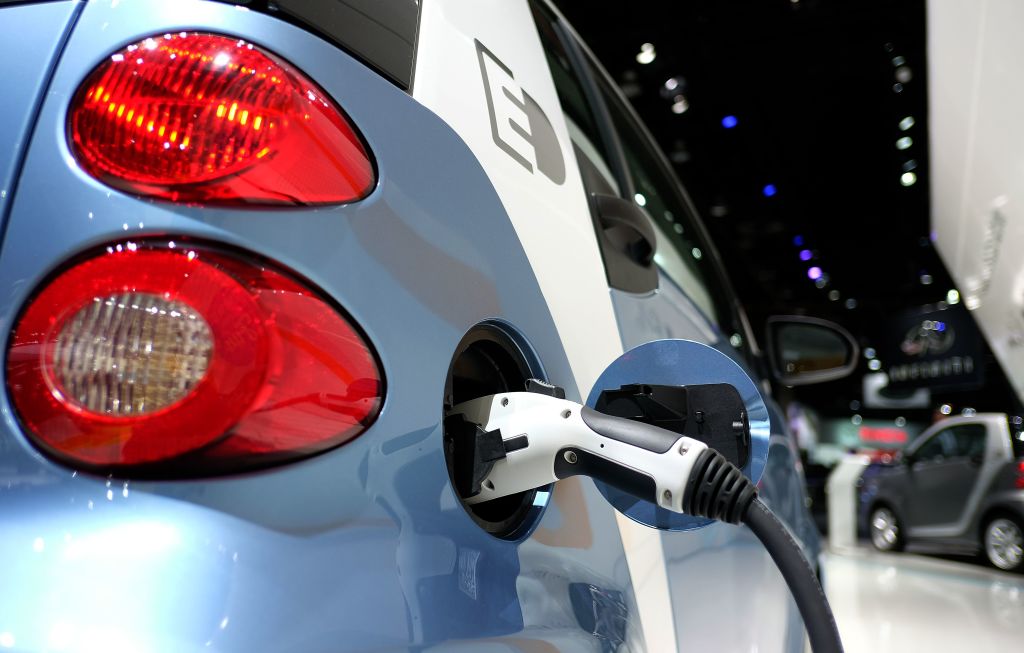An electric vehicle tax credit included in the Democrats’ mammoth “Inflation Reduction Act” promises a $7,500 tax credit to electric vehicle purchasers.
There’s one catch, however: No one could claim the credit because virtually no electric vehicles qualify under the terms of the law.
John Bozzella, president and CEO of the Alliance for Automotive Innovation, explained the situation in a blog post Friday.
“[T]here are 72 EV models currently available for purchase in the United States including battery, plug-in hybrid and fuel cell electric vehicles. Seventy percent of those EVs would immediately become ineligible when the bill passes and none would qualify for the full credit when additional sourcing requirements go into effect. Zero,” he wrote.
“Put another way, Americans who would otherwise receive the credit today (say, the family test driving a car this weekend and on the fence about whether to make the switch to an EV) will no longer be able to take advantage of this financial incentive to purchase an EV,” Bozzella said.
“The $7500 credit might exist on paper, but no vehicles will qualify for this purchase incentive over the next few years. That’s going to be a major setback to our collective target of 40-50 percent electric vehicle sales by 2030,” he said.
People keep saying climate change is an urgent, existential crisis. And yet: “The Democrats have crafted an electric vehicle tax credit not a single car on the market would qualify for.” https://t.co/HQTLZdSBjC
— Scott Lincicome (@scottlincicome) August 8, 2022
Writing for Reason, Joe Lancaster noted that President Joe Biden’s initial Build Back Better proposal included a tax credit that would have applied to all of one vehicle — the Chevrolet Bolt.
“Now, not one single vehicle qualifies for the full rebate,” he wrote.
“If two bills in two years have proposed electric vehicle rebate programs that would apply to virtually no cars, Democrats’ electric vehicle plans are clearly at odds with reality,” Lancaster said.
The issue stems from restrictions in the bill the Senate just passed that require that starting in 2024, an EV has to have at least 40 percent of the battery’s components from either the U.S. or a nation with a trade agreement.
Materials cannot come from a “foreign entity of concern,” such as China.
By 2029, battery components have to be 100 percent made in North America to get the tax credit, according to The Verge,
The auto industry says most electric cars won’t qualify for an EV tax credit in the Inflation Reduction Act because of the bill’s requirement that the vehicle have a battery built in North America with minerals mined or recycled on the continent: https://t.co/xEgeyHVfmF
— Michelle L. Price (@michellelprice) August 9, 2022
That’s a deal-breaker for now, because, China has 76 percent of the world battery market, against 8 percent for the U.S.
Companies are building factories to make batteries. Ford and South Korean battery manufacturer SK Innovation have factories planned in Tennessee and Kentucky. GM has four new ones in the works. Toyota and Stellantis, parent company of Dodge, Jeep and Chrysler, are also getting started.
Lancaster noted that the stipulation was part of the price of Democratic Sen. Joe Manchin’s support for the bill.
“I don’t believe that we should be building a transportation mode on the backs of foreign supply chains. I’m not going to do it,” the West Virginia Democrat said.
The Democrat-led House is expected to approve the Inflation Reduction Act this week, after which it will go to President Joe Biden for his signature.
This article appeared originally on The Western Journal.

























 Continue with Google
Continue with Google